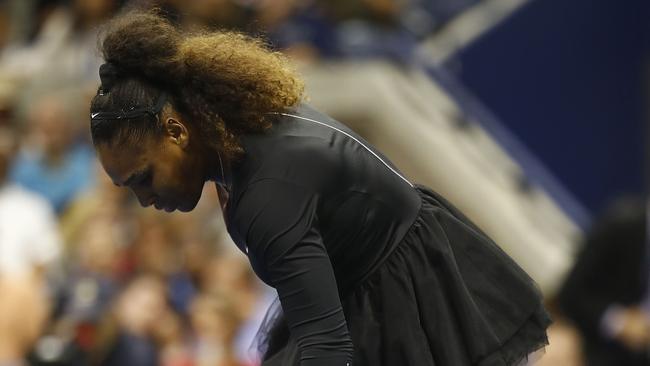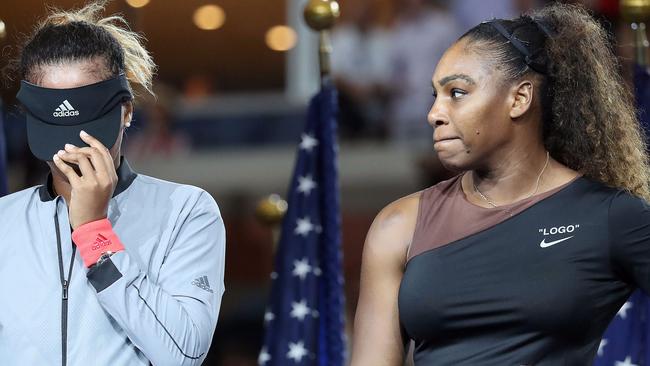Serena’s actions were about more than a broken racquet
WHY did umpire Ramos invoke an inconsistent rule that is almost never used in a major final? To remind the world’s greatest female athlete of his power, writes Tiffany Bakker.

Rendezview
Don't miss out on the headlines from Rendezview. Followed categories will be added to My News.
FIRST things first.
Naomi Osaka is a rising star and, as of last Saturday, a Grand Slam champion.
There is little doubt the 20-year-old deserved to win the US Open on the weekend. She was by far the better player on the day and would likely have beaten her childhood hero Serena Williams fair and square had the ugliness that ensued between one of the greatest players of all time and umpire Carlos Ramos not occurred.
Instead, what we’re left with is a compromised result, a blight on this great game. Tennis’ bright future apologising for winning and a superstar bullied and brought down to size for expressing anger and emotion, something women — particularly women of colour — across the board have been penalised for since forever.
However unfortunate you find the actions of Ramos or Williams, the clash served to expose a raft of inequities that urgently need to be addressed — where the tennis court is just a microcosmic version of a society approaching boiling point on issues of race and gender.
Williams has always been a passionate, emotive player. But she’s always, always paid for it.
Writing in The Washington Post, tennis icon Billie Jean King wrote that Williams “has always been treated differently to male players”.
On Saturday, chair umpire Carlos Ramos accorded Williams a conduct violation for illegal coaching, after spotting her coach Patrick Mouratoglou signalling from the stands. He invoked an archaic rule about on-court coaching that has been going on for decades. Decades. There was no “soft warning”; no mention of it to Williams that she should be mindful. Nothing.

The intractability of his ruling made Williams feel she was being called a cheat.
(In fact, the Women’s Tennis Association has been trialling on-court coaching at tournaments and, it is acknowledged industry-wide, that this will soon be legal across the board for men and women.)
So why, then, in this moment, did Ramos decide to invoke an inconsistent rule that is almost never used, in a major final between Williams — on return from the birth of her daughter and her recovery from serious health issues — and future star in Osaka, which should have been a cause for celebration?
I sat in the Flushing Meadow stands and watched both of these women power through their semi-finals. Osaka even beat the homegrown American Madison Keys but still the crowd’s appreciation for her was palpable.
There was joy for the youngster after her semi and, when asked by the court announcer if she had a message for Williams, the Japanese-Haitian player said: “Tell her I love her.”
But during the final there was no celebration. Yes, Williams abused her racquet, and Ramos rightfully penalised her for it, but he also abused his authority. He was petty. He allowed a situation to escalate to the point where it boiled over unnecessarily. Ramos escalated a tense situation instead of diffusing it, as is his job. That he so obviously inserted himself into the match and ruined the moment for both players is fact.
What Ramos did was let his ego ruin what should have been a shining moment for both players. He wanted to let Williams know who the boss was and he did it with all of the subtlety of a sledgehammer.

Not to mention that Ramos has put up with worse from a male player.
At the French Open in 2017, Ramos penalised Rafael Nadal for wasting time, and the Spanish champion told him he would make sure that Ramos never refereed one of his matches again. Nadal ranted and raved and did not face any of the same recriminations Williams did.
Laughably, during the very same tournament a typically petulant Nick Kyrgios was cajoled and babied by a male umpire to get over his sulking and go out and play the match. Kyrgios’ behaviour has been appalling for years and he has faced only minor recrimination from officials.
Jimmy Connors once called an umpire “an abortion” with no fallout. John McEnroe … well, where do we start? (OK, he was thrown out of the Australian Open in 1990, but still …)
Former US pro James Blake, tweeted, “I will admit I’ve said worse and not gotten penalised. And I’ve also been given a ‘soft warning’ where they will tell you to knock it off.”
As Williams said at a press conference after the game, “I’ve seen other men call other umpires several things, and I’m here fighting for women’s rights and for women’s equality … For me to say ‘thief’ and for him to take a game? … It was a sexist remark. He’s never took a game from a man because they said thief. For me, it blows my mind. But I’m going to continue to fight for women.”
Serena and Venus Williams have changed tennis for the better. Poor black kids from poverty-stricken Compton in Los Angeles who managed to infiltrate a traditionally stuffy, very white sport — as Tiger Woods did in golf — dominate it, and open it up for kids who probably never thought entree into that world was ever possible.
The crowd watching Serena Williams during her semi-final was largely African-American, something I have seen change — as a longtime observer and writer of the sport — exponentially. A decade ago, that would have been unheard of, but such is the impact the Williams sisters have made on tennis’ changing demographic.

Also, let’s be blunt: America is a strange old place right now. The divisions are raw, pronounced and palpable. Living here, in this current climate, is not always pleasant. And unless you are right in the midst of it, it’s difficult to describe the ongoing tensions.
In recent weeks, the release of a major Nike campaign featuring former NFL star Colin Kaepernick has caused such outrage in the US, it has prompted people to go to the maddening lengths of cutting the Nike logo from their clothes or even burning them.
African-American Kaepernick became a lightning rod in the national debate over racial oppression, by peacefully protesting against police brutality and other injustices, by taking a knee as the anthem played before football games, and inspiring many others to do the same.
Williams boycotted the Indian Wells tournament in California in 2001 after fans booed because her sister Venus pulled out of their semi-final match with injury. She and her father Richard were subjected to ugly, racial taunts from the crowd.
Williams did not return to compete at Indian Wells until 2015.
Williams’ timing on Saturday may have been off but there was a sense that these were longstanding frustrations that erupted from within her. And as much as people may lament Osaka’s moment being ruined, she arguably stands to benefit from Williams’ stand, for decades to come. This is about so much more than a broken racquet.
Tiffany Bakker began her career at Australian Tennis Magazine in Melbourne. She is now Deputy Editor of News Corp Australia’s New York bureau.
@TiffanyBakker
